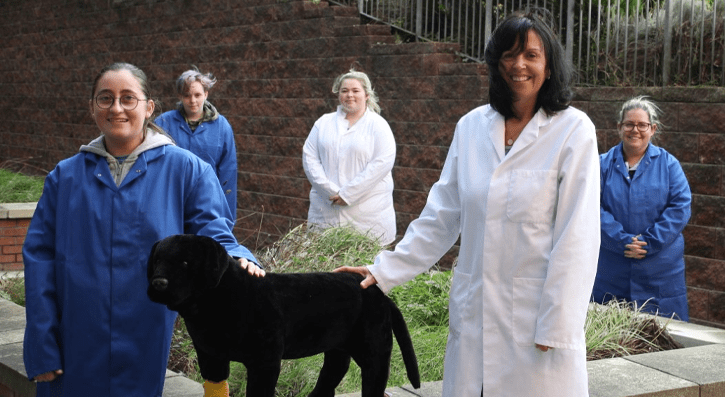Top Tips on Animal Care over Halloween
0 min read
27 October 2021

Level 2 Animal Care students from South Eastern Regional College have been highlighting the potential dangers to pets and animals during the Halloween festivities.
Diane McKay, Animal Care Lecturer said, “This time of year can be very stressful for pets and animals, so our students are keen to share how everyone can make it a less anxious time for them with a little bit planning. As part of their course, the students, have been researching the dangers to pets and animals and are keen to share their top tips for keeping them out of danger over the holiday.
These include:
- Walk your dog early to avoid loud noises from fireworks and keep pets indoors when the festivities start, perhaps with the radio on in the background
- Check all bonfires well before lighting for small animals such as cats and hedgehogs
- Don’t put costumes on pets, cute as it may seem, they can be uncomfortable and cause stress
- Keep dogs away from your door, with food and water, so they don’t worry about the flow of people in costumes trick or treating. Reassure them with constant check-ups
- Chocolate and grapes can poison dogs – make sure treats for humans are kept away from animals
Diane went on to say, “Lots of households have added a new member to their family over lockdown and have purchased a puppy and there have been horrific stories in the media about illegal breeding of puppies to meet demand. Before considering getting a puppy you need to think of the following:
Time commitments – How much time can you and your family spend with the puppy? Due to lockdown lots of households have been at home but that is now changing with kids returning to education and restrictions being lifted, meaning puppies can be home alone. Lots of dogs are now suffering from separation anxiety because their owners are not at home 24/7 and this can mean their pets are now suffering from anxiety due to being left home alone.
Is the breed suitable to your lifestyle? - If you are very active and out walking a lot, then active breeds would be best suited to you, but if you are less mobile then smaller less active breeds may be more suitable for your lifestyle.
Financial - You need to think if you can afford a dog. Costs like food, grooming, accessories, insurance, vet bills and even a short stay in kennels can soon become expensive. So before purchasing a new puppy ensure it is financially viable for you and your family.
Reputable Breeder, Charity or Dog Pound - Puppy farming has been on the rise. Prices for a new puppy have now doubled or tripled. So be careful you are not getting your new puppy from a ‘puppy farm’ – an illegal breeder who does not care for the welfare of animals and is simply looking to make a profit. A few simple steps can help you check your new puppy is coming from a reputable breeder:
Always ensure you go to the breeder’s home and see mummy with her puppies.
Puppies should never leave mum before 8 weeks. You should ensure your puppy has had its first vaccination and has been wormed - ask for proof of this. Parvovirus is one of the main life-threatening diseases in puppies and all puppies should be vaccinated against Parvovirus and other major diseases for dogs.
Please ensure your puppy has been fully vaccinated before taking it out for walks in public areas. Parvovirus and other diseases can be shed via faeces from infected dogs.
If the puppy is KC registered, this will also ensure the mummy has not been over bred. Purchasing a new puppy from a reputable breeder will also help.
Never meet someone on the roadside to see puppies. Always view the puppies in their home environment with mummy.
Diane concluded, “The first few months of a puppy’s life is very important in shaping them into the adult dog they are to become. Socialising them with other dogs and humans is very important, but with lockdown some puppies have missed out on vital socialisation which may lead to a more nervous puppy/adult dog around other dogs and people. So, if you do get a puppy, make sure you take steps to introduce them to humans outside your home and other dogs when they have been fully vaccinated.”
Page Tags
SERCLatest News
Keep up with the latest from SERC



